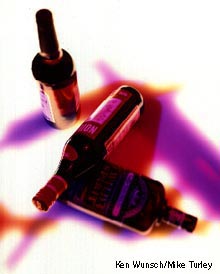
The current law promotes irresponsible use of alcohol.
By Paul Christner
BINGE-DRINKING. Probably a term you would be sick of hearing right now if you were living on Penn’s campus, as I am. It was a subject of debate throughout the fall semester, following the deaths from alcohol-poisoning of freshmen at LSU and MIT. Although Penn’s students luckily avoided similar outcomes, more than a few freshmen here found themselves ending the evening at HUP. Clearly, alcohol abuse is a problem that Penn and universities across the nation must address.
However, current state law cripples the University’s ability to provide any kind of aid. I am referring to the Pennsylvania law that prohibits drinking until the age of 21. Because of it, Penn is not allowed to promote responsible drinking on campus. Instead, it must simply “take a stand” against underage drinking.
We all know what happened with Prohibition. The case is similar at most colleges and universities today. It is illegal for the majority of students to drink, but statistics show that most of them do, anyway. That leaves Penn in a tough situation, and the correct course is unclear. One thing that is clear, however, is that the University must not place heavy penalties on students who have been drinking. If it does, students who have had dangerously too much to drink may not seek medical help for fear of getting punished for underage drinking. Trying to remove alcohol from the fraternity-party scene is also not the answer. Students will still drink — only off-campus, in less safe areas.
In the current situation, the University effectively has its hands tied. But universities have always been places to promote change, and a change in the role played by alcohol is needed not only at the university level but also in American society as a whole. There is such an effort to keep alcohol away from children in this society that it becomes a fascination for them. Many times, ready access to alcohol comes for the first time in college. An unsupervised freshman dorm room is one of the most conducive settings for binge drinking. Many students come to college unaware of what alcohol can do to them. Sadly, it will be difficult for universities as a whole to have a serious impact on the situation if society does not change its views on alcohol.
During a semester abroad in France, I witnessed a totally different attitude toward drinking. Although alcohol was an important part of the social scene, it was not the focus. Alcohol often becomes the main point of American college parties — because it is illegal. I have all too often watched friends go out with the intention of getting completely drunk and barely making it home, or even vomiting, later on.
I am not suggesting that Penn openly allow all students to drink. That would not be possible and it would not achieve the intended results. However, Penn could make it mandatory for all freshmen to attend an alcohol-awareness seminar alerting them to the fact that alcohol can kill them. Responsible drinking can also be promoted along with the fact that it is illegal to drink under the age of 21. Penn does not have to openly embrace drinking on its campus by any means, but trying to eliminate drinking from social events would be impossible and unrealistic. A simple realization that students will drink — and letting them know the risks and how to do it responsibly — would certainly help some students.
The authorities at Penn should also not penalize students who have been drinking simply for drinking. If students cause other problems while drinking, such as violence or disorderly conduct, that is another issue. However, according to a guest editorial in the December 5, 1997 Daily Pennsylvanian, a student who called the Penn police for help in stopping an altercation was slapped with an underage-drinking charge. Do you think that student will call the police again if he is in trouble and has had anything to drink? My point is, underage drinking is not a problem in itself if done responsibly. Binge-drinking is a problem and drinking (underage or not) is a serious problem when it leads to violence, drunk-driving, or other criminal acts.
Every individual is responsible for his or her own actions, and Penn is in no way responsible for a student’s stupid decision to binge-drink. However, if the University took a realistic attitude towards the drinking situation, maybe some binge-drinking and binge-drinking-related tragedies could be avoided.
Paul Christner is a junior double-majoring in French and German. He is originally from Philadelphia.




